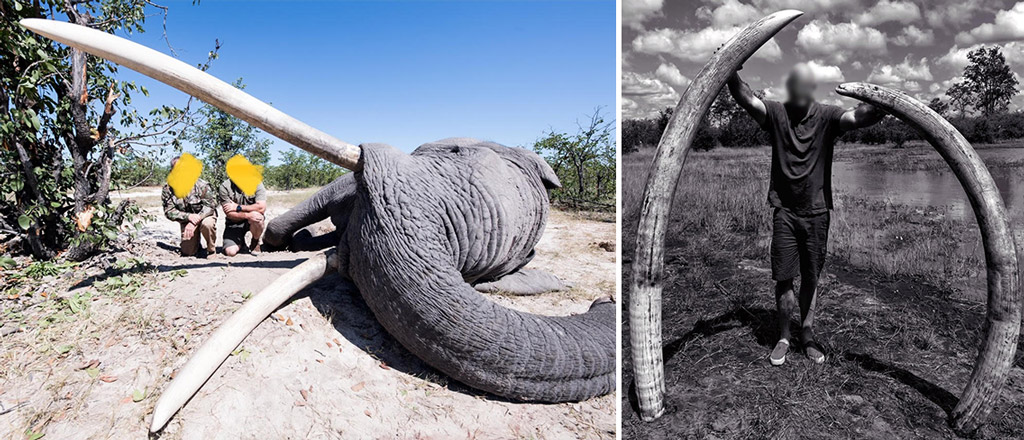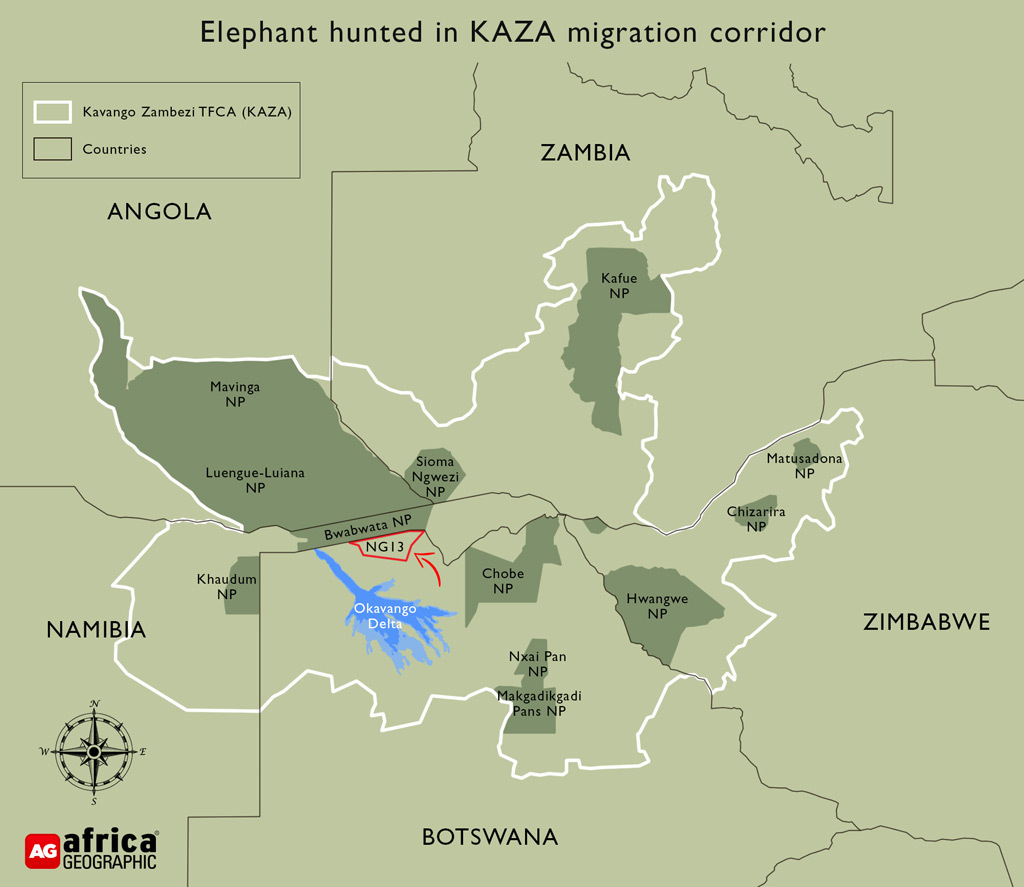Post-publishing amendment (22 August 2023): After this post went live, we received the results of an audit of the Tcheku Community Trust, reflecting significant financial irregularities. The most serious involves the trophy hunter featured below. According to the audit report, the 2022 trophy hunting fee of US100,000 paid by the hunter was about half of the stipulated reserve price. The audit report reveals that the Trust general manager accepted the lower offer from the trophy hunter without the required approval of the Trust Board. This accounts partly for the extremely high gross profit made by the trophy hunter, as revealed below.
NG13 is a remote, largely unpopulated 2,907km2 (290,000ha) region in northern Botswana zoned for multiple uses, including photographic tourism and trophy hunting. It shares its 100km northern border with Namibia’s Bwabwata National Park. Much of the boundary fence is broken, resulting in the free movement of wild animals.
This is where Botswana professional hunter Leon Kachelhoffer bagged one of Botswana’s largest elephants in a trophy hunt last year for his client – a giant of a beast and one of the dwindling population of tuskers (elephants with tusks weighing at least 100 pounds each) left in Africa. When we reported on the hunt, we questioned how beneficial this hunt was for local communities in desperate need of a sustainable livelihood. Now we have access to information and figures documenting the likely profit made by Kachelhoffer in 2022 and the scraps that go to local communities.

What are the benefits for local people of trophy hunting in NG13?
The people in and around NG13 are few and far between – they eke out a subsistence living from this sandy, arid landscape. The Tcheku Community Trust was established to represent them and to channel revenue from the commercial exploitation of the area via tourism and hunting.
The aforementioned Kachelhoffer has tied up the Tcheku Community Trust in a five-year deal that gives his company, Old Man’s Pan Pty Ltd, exclusive trophy hunting rights. The Botswana government allocates annual trophy hunting quotas to each region, and, in NG13’s case, they are obliged to sell those rights to Kachelhoffer. In 2022, Kachelhoffer paid Tcheku Community Trust the total sum of BWP 1,346,000 (+/- US$100,000) for that year’s quota. The quota included five elephants and two leopards, amongst other species. These are verified figures taken from the NG13 management plan, of which we have a copy.

What are the benefits for the NG13 trophy hunter?
The revenue assumptions per species hunt below are based on information provided by Botswana professional hunters.
Old Man’s Pan Pty Ltd
Trophy hunting NG13 income statement – 2022 estimate
| REVENUE FROM NG 13 TROPHY HUNTING | 5 elephants – US$ 75,000 each | US$375,000 |
| 2 leopards – US$ 35,000 each | US$70,000 | |
| Total revenue (excluding minor species) | US$445,000 | |
| DIRECT COSTS | ||
| Payment to Tcheku Community Trust | BWP 1,346,000 | – US$100,000 |
| Government trophy tax | 5 elephants at BWP 70,000 each | – US$26,000 |
| 2 leopards at BWP 50,000 each | – US$7,500 | |
| Total costs | – US$133,500 | |
| Annual gross profit | US$311,500 |
Assuming that the quotas remain consistent, Kachelhoffer stands to pocket about US$1,6 million over five years. Add in the likely addition of lions in the future, and his revenue will skyrocket. Not bad off zero long-term or infrastructural investment, and when your only other material costs relate to attending hunting shows to market this and other trophy hunting areas. Note that this revenue estimate excludes what Kachelhoffer charges his clients for accommodation and other services, on which he will also likely earn a margin.
AS AN ASIDE, the surgical removal of Africa’s remaining giant tuskers makes no conservation sense
Current anecdotal estimates indicate that fewer than 100 tuskers remain in Africa (mostly in Kenya, which is free of trophy hunting), of which fewer than 30 are true giants, whose tusks touch the ground. Killing them has no impact on human-wildlife conflict, as these big bulls are not the culprits, and it does not solve Northern Botswana’s ‘elephant overpopulation problem’. NG13 lies within the KAZA Transfrontier Conservation Area, established to enable wildlife – especially elephants – to disperse away from human-wildlife conflict areas. So what is the conservation benefit of hunting the last remaining giant elephants? This is an important question that is unfortunately brushed aside by those who benefit financially and politically from removing the last giant elephants.
I also believe that setting leopard hunting quotas when leopard population estimates are vague at best and often non-existent is absurd and not scientific. Surely the term ‘sustainable utilisation’ cannot be applied when no reliable data exists?
For now, though, let’s ignore the glaring conservation issues and focus on the supposed benefits to local people of trophy hunting in NG13.
It’s clear from the analysis above that local communities receive a financial pittance for their resources. What about the rights, dignity and upliftment of NG13’s people? Menial seasonal jobs and a few servings of meat do not cut it, in my opinion. This is nothing more and nothing less than the plundering of local community resources by hardened wealthy businessmen.
Is this the true face of Botswana’s much-acclaimed ‘sustainable’ trophy hunting strategy? In May 2019, Botswana’s President Masisi justified the decision to recommence trophy hunting by emphasising that local communities will be guaranteed more than just menial jobs and enjoy sustainable wildlife management’s economic benefits. I have no conceptual issue with controlled, sustainable hunting based on sound scientific principles in areas where photo tourism fears to tread – because Africa’s people HAVE to be incentivised to have wild animals in their midst. Otherwise, we will end up like much of the ‘developed’ world – devoid of free-roaming wildlife. But is this how President Masisi envisaged involving impoverished, marginalised communities in the wildlife industry?
Why does the Botswana government allow its people to be taken for a ride and their natural resources to be plundered? What hold do Kachelhoffer and his cronies in the trophy hunting industry have over decision-makers at the local and government level? Why do local people sign these abusive binding contracts? So many questions. But we know that asking the perpetrators and trophy hunting representative bodies is a waste of time – they either ignore us, make legal threats, attack our integrity and/or provide nonsense spin.
To add further dimension to the situation, my sources inform me that some members of the Tcheku Community Trust are accusing its management of embezzling BWP 1.3 Million (about US$100,000) and have requested the District Commissioner to intervene with an audit to trace the missing funds.
I could go on about many aspects of this pillaging of African people and their resources, but I won’t. Hopefully, the abovementioned situation is sufficient to convince you that all is not well and that the decision-makers must step in and root out the rot.
A luta continua …
To comment on this story: Login (or sign up) to our app here - it's a troll-free safe place 🙂.![]()






